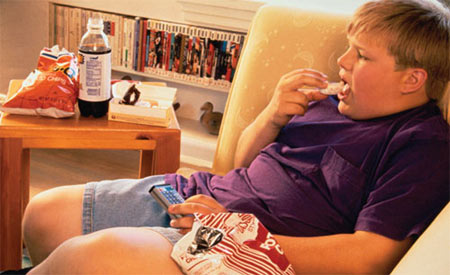
- What I can do about overweight children?
Exogenous obesity is a nutritional disease that is defined by excess body fat resulting from consumption of a diet of higher caloric value to the child's needs.
(13)
Obesity has a multifactorial etiology, where free food availability, changes in eating habits, sedentary lifestyle or psychological and social factors are crucial. Today is considered by consensus:
BMI> 85: OVERWEIGHT
BMI> 95: OBESITY
PREVENTION
Obesity is a chronic disease whose treatment results with both dietary pattern change and active life and / or pharmacological, are very limited, so prevention is a priority, (14), and more, knowing that:
- 30% of adults were obese as children. (1)
- Obesity that begins in childhood can have worse consequences than obesity that begins in adulthood. (2)
Prevention strategies are divided into:
1 - UNIVERSAL PREVENTION
2 - SCREENING PEOPLE AT RISK PREVENTION OR SELECTIVE
3 - TREATMENT OF CHILDREN WITH OVERWEIGHT PREVENTION OR DIANA
It is increasingly evident the importance of prevention. Have demonstrated the protective effect on future obesity and its duration is inversely associated with risk of obesity. - Reduction of food with high fat content. Will recommend an adequate intake of monounsaturated fat (olive oil) and polyunsaturated (soybean oil, fish etc.), along with reduced saturated fat intake (cold cuts, pastries, ice cream, etc)
- Avoid excessive consumption of protein. It's probably the activity that our children spend more time. Reduce TV viewing and physical activity also promotes food intake promoted by the TV itself.
Avoiding TV in the nursery
- The involvement of children in small chores.
- Attempt to structured physical activities (swimming, biking, running, dancing, etc.).
Before 3 years of age parental obesity is more predictive of future obesity that the sheer weight (2)
- Periods of clinical relevance: There are 3 critical periods of obesity in childhood: on 1 year, before 6 years and adolescence. Also in preadolescence an obesity predicts possible future obesity.
After 10 years, the fat of the parents is less important than the child to predict obesity in adulthood. (An obese child with 4 years has a 20% risk of future obesity)
(2)
3 - TREATMENT OF CHILDREN WITH OVERWEIGHT
A multidisciplinary program combining dietary restriction, increased physical activity, nutrition education and behavior modification are the mainstays of treatment.
Patterns of psychological treatment involves self. It is very important that family intervention and family patterns are very influential. Parents should bring the full weight of the treatment in children under 5 years. For over 9 years will be greater accountability to the child, and she was a teenager the family role significantly decreased (7)
Diet therapy: low-calorie diets differing in dietary hygiene, food information temporarily prohibited, recommended food standards, guidelines for conducting and meals. Reviews of systematic reviews:
- There is no evidence that any drug treatment is effective in childhood obesity to
- The low-calorie diets are less effective in the medium term that changing lifestyles
- Obesity can be prevented by changes in lifestyle such as increasing physical activity or decrease TV time
- The tests show similar results by comparing the increase in physical activity with reduced sedentary behavior.
- Family support is necessary for successful treatment.
No comments:
Post a Comment